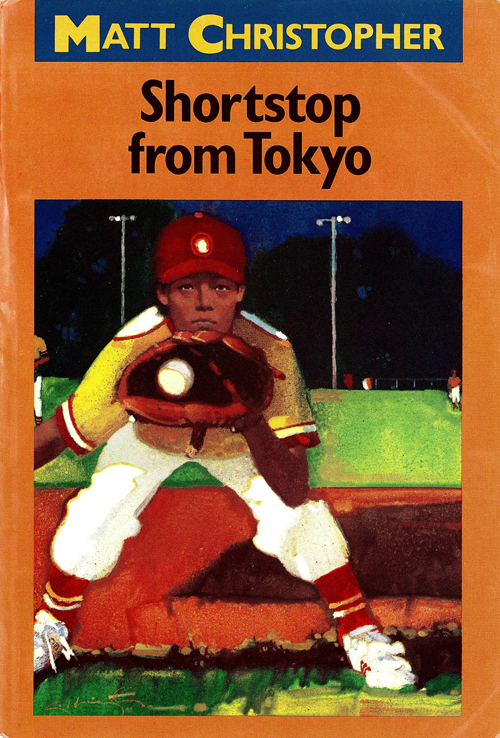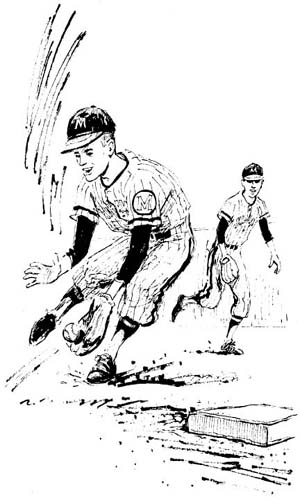Shortstop from Tokyo
Read Shortstop from Tokyo Online
Authors: Matt Christopher


Sports Stories
THE LUCKY BASEBALL BAT
BASEBALL PALS
BASKETBALL SPARKPLUG
LITTLE LEFTY
TOUCHDOWN FOR TOMMY
BREAK FOR THE BASKET
BASEBALL FLYHAWK
CATCHER WITH A GLASS ARM
THE COUNTERFEIT TACKLE
MIRACLE AT THE PLATE
THE YEAR MOM WON THE PENNANT
THE BASKET COUNTS
CATCH THAT PASS!
SHORTSTOP FROM TOKYO
JACKRABBIT GOALIE
THE FOX STEALS HOME
JOHNNY LONG LEGS
LOOK WHO’S PLAYING FIRST BASE
TOUGH TO TACKLE
THE KID WHO ONLY HIT THE HOMERS
FACE-OFF
MYSTERY COACH
ICE MAGIC
NO ARM IN LEFT FIELD
JINX GLOVE
FRONT COURT HEX
THE TEAM THAT STOPPED MOVING
GLUE FINGERS
THE PIGEON WITH THE TENNIS ELBOW
THE SUBMARINE PITCH
POWER PLAY
FOOTBALL FUGITIVE
JOHNNY NO HIT
SOCCER HALFBACK
DIAMOND CHAMPS
DIRT BIKE RACER
THE DOG THAT CALLED THE SIGNALS
THE DOG THAT STOLE FOOTBALL PLAYS
DRAG-STRIP RACER
RUN, BILLY, RUN
TIGHT END
THE TWENTY-ONE-MILE SWIM
WILD PITCH
DIRT BIKE RUNAWAY
THE GREAT QUARTERBACK SWITCH
SUPERCHARGED INFIELD
THE HOCKEY MACHINE
RED-HOT HIGHTOPS
THE HIT-AWAY KID
THE DOG THAT PITCHED A NO-HITTER
Animal Stories
DESPERATE SEARCH
STRANDED
EARTHQUAKE
DEVIL PONY
COPYRIGHT
© 1970
BY MATTHEW F. CHRISTOPHER
ALL RIGHTS RESERVED. NO PART OF THIS BOOK MAY BE REPRODUCED IN ANY FORM OR BY ANY ELECTRONIC OR MECHANICAL MEANS INCLUDING INFORMATION STORAGE AND RETRIEVAL SYSTEMS WITHOUT PERMISSION IN WRITING FROM THE PUBLISHER, EXCEPT BY A REVIEWER WHO MAY QUOTE
BRIEF PASSAGES IN A REVIEW.
First eBook Edition: December 2009
Hachette Book Group
237 Park Avenue
New York, NY 10017
Visit our website at
www.HachetteBookGroup.com
ISBN: 978-0-316-09423-8
Contents
How many of these Matt Christopher sports classics have you read?
to
Joe, Jan, Chandra, Kihm and Joey
G
ET two, Stogie!”
“Let ’er come!” Stogie Crane yelled, back-trotting to deep short. He smacked the pocket of his glove a couple of times and
crouched forward, arms dangling, at the edge of the infield grass.
Coach Bob Dirkus, standing by home plate, tossed up the ball and rapped a hot, bouncing grounder a few feet to Stogie’s right
side. The wiry shortstop rushed behind it, fielded the ball neatly, and whipped it underhand to second. Second baseman Russ
Russo caught it on the bag
and pegged it to first. The peg was high but Bob Sobus jumped and speared it.
“Home it!” yelled the coach.
Bob, a left-hander, pivoted on his left foot and whipped the ball to Tony Francis. Tony pegged it across the diamond to Stogie,
covering the keystone sack. His throw was high too, and Stogie had to jump. He snared the ball in the small web of his glove,
laughed over it, then pegged it to Fuzzy Caliel at third and Fuzzy winged it home.
“Two again!” yelled the coach.
Stogie Crane smiled across at Russ. “Muff it and you’re a hunk of cheese!”
“You’re on!” cried Russ.
The grounder was to Russ’s left side. He got behind it, nabbed it and fired it to second. Stogie, grinning like a cat, caught
it at his knees on the run, stepped on the sack and whipped it to first. It was a strike throw. Bob caught it and zipped it back to Russ, who had to run hard to cover
his base. The throw was wide and sailed out to the outfield, where an outfielder picked it up and tossed it in.

“What do you want me to do — throw it into your pocket?” yelled Bob.
The skinny second baseman wiped his brow and flicked the sweat off his fingers. “I’m sorry. I left my long arms home!”
Stogie chuckled. “Just make those throws good when we tackle the Copperheads,” he reminded.
“Snakes alive!” cried Russ. “We playing those guys tomorrow?”
“Playing, you say? Man, you’d better not forget your tommy-hawks! We’d better slaughter those guys in the first inning. We
can’t —”
“Quit your jabbering out there and get down to business!” yelled Coach Dirkus. “Get two, Bob!”
Bob caught the big hop, rifled it home, caught Tony’s quick return throw on the bag, then pegged the ball across the diamond
to Fuzzy.
“Hey, Stogie,” said Russ, as Fuzzy lollied the ball in to home. “Here comes what’s-his-name, that Japanese kid.”
“Sam Suzuki,” said Stogie.
The kid had just come around the dugout with a short, stoutish man who was his father. Sam Suzuki was short, too, for his
age. He was about as old as Stogie and the other kids on the Mohawk baseball team. What surprised Stogie was that Sam was
wearing a Mohawk uniform. Boy, he certainly hadn’t wasted time in getting acquainted with Coach Dirkus. Well,
maybe the coach wanted no argument with Sam’s father, a judo expert.
The coach waved to Mr. Suzuki, then motioned Sam forward. Sam, carrying a glove, smiled and ran up to him. Stogie couldn’t
hear what they said, but in a moment he could guess. Sam pointed toward short and then came running out.
“That’s Sam Suzuki, Stogie!” Coach Dirkus yelled. “Introduce yourself! Then I want you to alternate with him!”
Stogie’s chin dropped. He forced a smile to try to match the one plastered over Sam’s face and stuck out his hand. “Hi, Sam.
I’m Stogie Crane.”
“Hi, Stogie. I am Hideko Suzuki. Call me Sam.”
Stogie’s smile faded slightly. “Did you play shortstop in Japan?”
“I always play shortstop. My favorite
position.” Sam laughed. “You are not worried I play shortstop too, I hope?”
“No.” But Stogie’s smile flickered, then died.
Heck, why should he be worried? Sam didn’t really expect to take over the shortstop position, did he? Besides, Coach Dirkus
seldom let a kid play a full game. He would put in a sub about the fourth or fifth inning.
“Heads up, Russ!” cried the coach.
He bunted the ball in front of the plate. Tony flung off his mask, scurried across the plate, scooped up the ball and pegged
it to second. Russ caught it, snapped it to first, and Bob whipped it back to home.
“All right, now! Get one!”
Fuzzy fielded the low hopper and made the throw to first. The ball sailed home, back to Bob, then home again.
“Stogie!”
Stogie set himself at the edge of the grass, snatched the grass-cutting grounder, and pegged it letter-high to Bob. Sam’s
turn was next. Stogie backed him up, smiling as he watched the coach hit a soft grounder to the Japanese boy. Sam charged
the ball, caught it near the ground, snapped it underhand to Bob, then hustled to cover second.
Bob whipped the ball to him. Sam nabbed it out of the air, spun, and pegged it to third. The ball traveled like a white bullet.
“Nice going, Sam!” yelled Coach Dirkus.
Sam looked around and smiled at Stogie. “How do I look?” asked Sam proudly.
“Good, Sam,” said Stogie. “You look good.”
R
USSO! Peters! Crane! Let’s start off with some bingles!”
It was the next day and the Mohawks’ third game of the season. Coach Bob Dirkus stood in the sun next to the dugout, holding
a pad. He wore regular pants, but his shirt was part of a baseball uniform he used to wear when he had played with the Westport
Eagles. His black cap, the letter M on it, was the same as the Mohawk players’.
Larry Hill, the Copperheads’ tall left-hander, finished throwing his warm-up
pitches and Russ stepped to the plate.
“Look at ’im hug the plate,” observed Fuzzy. “It’s a wonder he doesn’t put his arms around it.”
“That’s his strategy,” said Dennis Krupa, a sub infielder. “Ten to one he gets on.”
Larry Hill fired two balls outside of the plate, got one over, then another for a two-and-two count. Russ stepped out of the
box and rubbed his hands in the soft dirt.
“His hands get hot quickly,” said Sam Suzuki, laughing. “Maybe should carry towel. Not so dirty.”
Stogie, standing to the right of the dugout with his bat, heard it all. The guys laughed, but he couldn’t see anything at
all funny in the remark.
Crack
! Russ belted a one-hopper to third. The Copperhead third baseman
snagged it easily and whipped it to first. “Out!” yelled the base umpire.
Beak Peters stepped into the box next. He was built like a young tree and had a nose that seemed to be too big for his face.
He let two pitches go by, both strikes, then stepped back and jiggled his helmet a couple of times. He walked back into the
box and blasted the next pitch through the pitcher’s box, making Larry Hill jump like a sca
l
ed cat.
“Your man, Stogie!” Fuzzy yelled. “Let’s start a merry-go-round!”
Stogie looked at Coach Dirkus. “If it’s in there, belt it,” said the coach.
The Copperhead infielders were talking it up, sounding like ten men out there instead of four. The Copperhead catcher was
talking it up too, sounding like a stuck
needle on a phonograph. “Right in here, Larry! Right in here, boy! Right in here, Larry! Right in here, boy!”
Boom
! Stogie’s bat connected with the ball and sent it cruising through space toward left center field. Beak streaked to second,
rounded third, and bolted for home as the third base coach windmilled him on. The left fielder finally got the ball and pegged
it in to third, forcing Stogie back to second for a neat double.
Stogie looked across the diamond at Sam Suzuki and saw the Japanese boy clapping thunderously. Somehow Stogie felt he needed
that hit. He wanted to show Coach Dirkus he was still the best man to play shortstop.
Jim Albanese, up next, popped the first pitch to short for out number two.
Bob Sobus came up. A left-handed hitter,
he stood at the plate straight as an arrow, his legs spread apart just a little, his bat held inches off his left shoulder.
Larry Hill slipped a strike past him. Bob swung at the next pitch and missed it for strike two. He swung at the third, and
this time bat met ball and sent it hopping like a frightened rabbit between first and second. Stogie rounded third and scored.
The throw-in held Bob at first.
“All right, Fuzzy-wuzzy,” said Dennis. “Practice what you preach.”
“Got your movie camera?” asked Fuzzy. “I’d like to do a commercial first.”
“Get up there and hit!” Coach Dirkus hollered at him.
Larry Hill stretched and delivered. The throw went into the dirt and past the catcher’s mitt to the backstop screen. Bob Sobus
trotted to second.